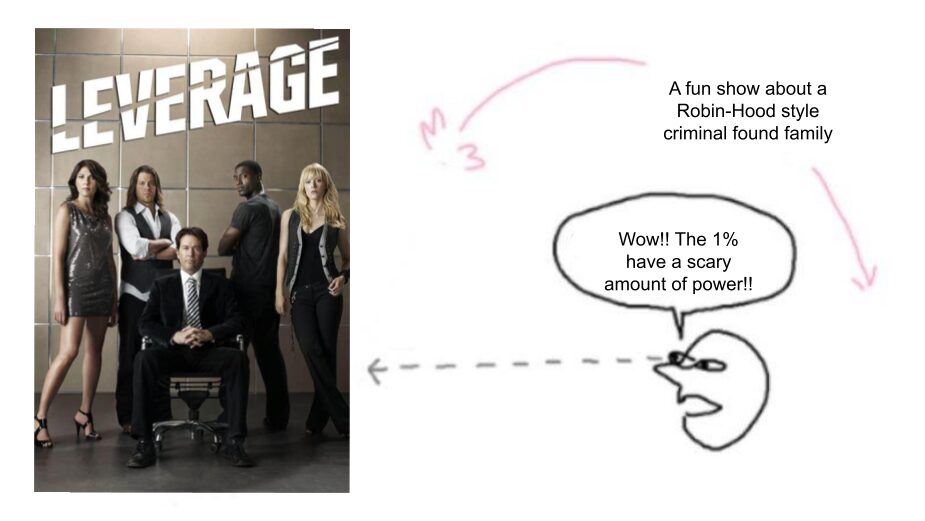I didn’t think much of Leverage when I first encountered it. The show aired on TNT from 2008–2012, a few years before I started getting obsessed with television, and when my mom and sister started watching, I was intrigued, but not grabbed. Even when I started watching the show it was a second monitor activity, something to have on while doing other things. The repetitive music and lack of overarching plot didn’t grab me. Worst of all, every single episode in the first season is paced exactly the same. Though I dragged my feet watching, the fantasy of the show’s premise kept me coming back. “The rich and powerful take what they want,” declare the opening credits, “we steal it back for you.”
Leverage follows a team of Robin Hood-style criminals, as each episode they steal from someone who has used their position of power to cause pain to a normal person. It’s a monster of the week show, but the monsters are the 1%. Memorable villains include the corrupt warden of a prison, a dying billionaire trying to steal a live heart meant for a child, and the CEO of an agriculture company who stole a genetically-engineered potato. Each of these villains receive their comeuppance in a neat forty-seven minutes, with enough time for the team to grab a drink and make a joke to end the episode on a lighthearted note.
It’s a profoundly Obama-era show, implicitly claiming that the systems running the world are working as they should, and it’s a few bad people in charge who are the problem. That warden who took a bribe to use his inmates as slave labor did so because he was corrupt, not because the system is set up to incentivise him to. Surely the next warden will be an upstanding person and not travel the same road. This assertion reads as extremely hopeful if not naive in 2025, where after years of the same problems under both Democrat and Republican administrations, it’s clear that it’s not that bad people are in charge of the system, but rather the system is built to value profit growth above all else, which elevates those with the same goals to steward it.
Many episodes end with the team dropping their mark in the custody of the Boston Police Department, ignoring that it’s often the rich and powerful who are able to turn that system to their advantage, and their victims who have the hardest time within the justice system. That each episode only has one victim or family of victims is also an oversimplification of our world, where the actions of the 1% affect large groups of people across the country and the world.
The team taking down a billionaire CEO never affects meaningful change, only in the lives of the CEO’s victim. There is no episode where the team takes down a fossil-fuel CEO who’s been sitting on the knowledge of human-caused climate change since the ‘80s and the world solves the crisis in response. It would take the show’s world too far away from our own. It’s the same reason Bruce Wayne will never solve the systemic problems of Gotham: we need to relate to the media we consume.
My problems with Leverage can’t be handwaved away because of the era it was produced in. The reboot series Leverage: Redemption, which started its run in 2020, also doesn’t engage realistically with the systems running our world.* You’d think that in the 2020s, after watching all the bullshit Elon Musk and his ilk have done in the past few years, that audiences would want a show to be a little more harsh on those in power.
Even so, I know it’s expecting too much for an hour-long show to grapple with the complex realities of the world. Having systems as a villain doesn’t make for a good story, and even if it were possible for five criminals to dismantle systemic oppression or the prison-industrial complex, it wouldn’t be entertaining to watch. The point of Leverage (and its sequel series) is not to show reality, it’s to be entertaining. And it is certainly entertaining, as the team bickers and quips their way through con after con, facing more ridiculous obstacles each episode while they work (if for only a moment) to confront those in power with some consequences for their actions.
*I’ve only seen a handful of Leverage: Redemption episodes as I write this, but from what I’ve seen it’s not significantly different from the original series.



